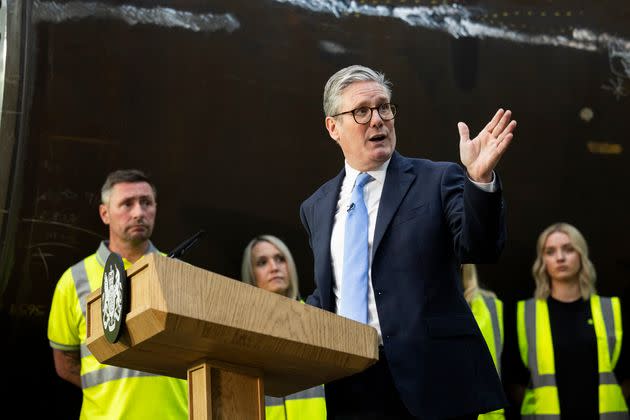Is Labour Bringing Back Austerity? Here's Why Commentators Are Divided

Prime minister Keir Starmer has made it abundantly clear “things are going to get worse” under the first few months of his leadership, as he looks to tighten the UK’s belt.
This is not a surprise – Labour has repeatedly blamed the Tories for leaving a £22bn black hole in the finances, which the new government says it has to fix.
Starmer has claimed that this fiscally-prudent approach will “fix the foundations” of the country and “grow the economy” in the long-term.
But do all his policies actually just pave the way for a return to austerity?
HuffPost UK takes a look at the main arguments both for and against ahead of Labour’s “painful” October Budget.
What is austerity and why does it matter?
Austerity is a policy introduced in the UK by the Tory-Lib Dem coalition after the 2010 general election.
The new government cut back on public services to try and reduce the enormous deficit after bailing out several banks during the 2008 financial crash.
Starmer himself warned against returning to austerity in the aftermath of the Covid lockdown back in January 2021.
Then the leader of the opposition, Starmer called for the Tories not to “make the mistake we made in 2010” where cuts to public services were blamed for slowing down the economic recovery.
He said he would prefer to “build and turbo-charge your economy rather than cut with austerity out of this”.
Chancellor Rachel Reeves also told the BBC during the election campaign: “There’s not going to be a return to austerity under a Labour government. We had austerity for five years and that is part of the reason why our economy and our public services are in a mess today.
“In the end, we have to grow the economy. We have to turn around this dire economic performance.”
Why do some critics think Labour is taking us back to austerity?
Starmer’s decision to reduce the winter fuel payments for pensioners has been condemned as Labour’s“first big mistake” by Lib Dem leader Ed Davey.
The new government has chosen to make the scheme means-tested, meaning only the poorest pensioners will still get between £100 and £300 this winter to help with their heating.
Around 10 million people in England and Wales will therefore stop receiving this extra allowance.
The PM also withdrew the whip from seven of his own Labour MPs who voted against the government’s decision to keep the two-child benefit cap earlier this year in another sign he is sticking to strict cuts.
Starmer has laid the groundwork for tax rises in the autumn Budget, too.
He said on Tuesday: “There is a Budget coming in October and it is going to be painful. We have no other choice given the situation we are in.”
He added: “Those with the broadest shoulders should bear the heavier burden.”
Starmer promised during the election campaign that National Insurance, VAT and income tax would not go up, meaning the government will probably look elsewhere.
He has refused to rule out raising fuel duty, and there is an expectation that capital gains tax or inheritance tax could be about to go up, too.
The Times also reported that the Treasury has asked departments to find around £3.2 billion in collective savings before the autumn Budget.
Plenty of left-wing critics – including the union Unite – have argued that the prime minister should prioritise a wealth tax, rather than going after pensioners.
Green Party co-leader Carla Denyer said: “We must generate the funds needed for investment by shifting the burden away from the poorest onto the wealthiest.
“Labour’s refusal to tax the super-rich shows that business as usual is very much still in business.”

Why do some claim Labour’s policies are not a return to austerity?
There is an argument that Starmer is delivering on his vision from 2021 and “turbo-charging” the economy rather than going ahead with cuts.
As the Financial Times’ Chris Giles pointed out: “The literal reason for the coming tax increases is more public spending than previously planned. Not austerity.”
Labour have pledged to recruit 6,500 more teachers to schools, 13,000 additional police and community officers and 40,000 more NHS appointments a week by paying staff more to work weekends and evenings.
The government’s willingness to increase public sector workers’ pay beyond inflation is also a marked change from the salary stagnation they’ve experienced over the last decade or so.
Labour have already awarded pay rises of 5% to 6% to about 3.5 million public sector workers, after two years of crippling industrial action under the Tories.
Shortly before Labour won the election, polls found voters were more likely to punish the party for not improving the NHS than increasing tax anyway.
As Portland’s head of research Gabriel Milland told HuffPost UK before voters hit the ballot box,:“The public aren’t fools”.
He added: “They know that taxes are likely to go up no matter who is in power.”


